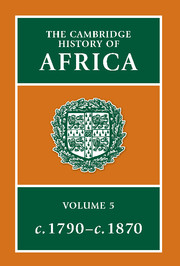Book contents
- Frontmatter
- Introduction
- 1 Egypt and the Nile Valley
- 2 Ethiopia and the Horn
- 3 The Maghrib
- 4 The nineteenth-century jihads in West Africa
- 5 Freed slave colonies in West Africa
- 6 West Africa in the anti-slave trade era
- 7 The forest and the savanna of Central Africa
- 8 East Africa: the expansion of commerce
- 9 The Nguni outburst
- 10 Colonial South Africa and its frontiers
- 11 Tradition and change in Madagascar, 1790–1870
- 12 Africans overseas, 1790–1870
- 13 Changing European attitudes to Africa
- Bibliographical Essays
- Bibliography
- Index
- References
12 - Africans overseas, 1790–1870
Published online by Cambridge University Press: 28 March 2008
- Frontmatter
- Introduction
- 1 Egypt and the Nile Valley
- 2 Ethiopia and the Horn
- 3 The Maghrib
- 4 The nineteenth-century jihads in West Africa
- 5 Freed slave colonies in West Africa
- 6 West Africa in the anti-slave trade era
- 7 The forest and the savanna of Central Africa
- 8 East Africa: the expansion of commerce
- 9 The Nguni outburst
- 10 Colonial South Africa and its frontiers
- 11 Tradition and change in Madagascar, 1790–1870
- 12 Africans overseas, 1790–1870
- 13 Changing European attitudes to Africa
- Bibliographical Essays
- Bibliography
- Index
- References
Summary
THE EROSION OF SLAVERY
Africa, like Europe, is a continent which has exported millions of colonists, who through their labours and initiative created the ‘New World’ of North and South America, with all that implies for the shape of the modern world. The African emigrants, almost without exception, were taken from Africa by force, and colonized America and the Caribbean as slave labourers. Thus, whilst helping to create the New World by their labour, the historical legacy of African immigration to the American hemisphere has left deep and bitter social, economic and political problems which are still far from solution. The period 1790– 1870 represents a great watershed in this historical movement of world significance. It is not, perhaps, a theme of Africa's domestic history, but none the less one which, through its effects on the relationships of ‘white’ and ‘black’ races and their attitudes to one another, has constantly had the effect of directly influencing the development of African, as well as European and American history.
The essential feature of the period under review is that it witnessed a revolutionary transformation in the legal and civil status of Africans and people of African descent living overseas. In 1770, although there were significant groups of free ‘people of colour’ in North and South America, the Caribbean, and Britain, they were small in number, and emancipated by individual acts, as part of no movement hostile to slavery as such. In general in 1770 white people felt it to be acceptable and normal that the status of black men outside Africa should be that of slavery.
- Type
- Chapter
- Information
- The Cambridge History of Africa , pp. 418 - 457Publisher: Cambridge University PressPrint publication year: 1977

